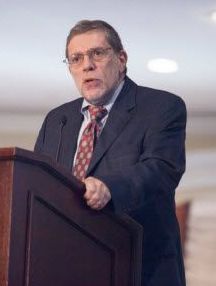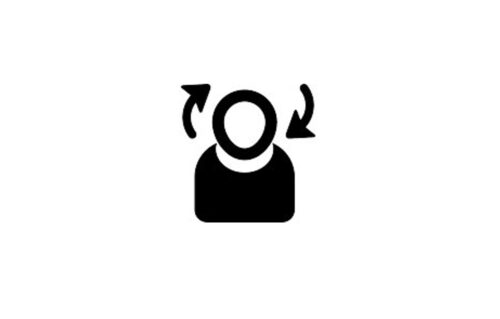His voice should still be heard now.
Rick Cohen, who died suddenly in November 2015, was at the time the national correspondent for the Nonprofit Quarterly, after serving as executive director of the National Committee for Responsive Philanthropy from 1999 to 2006. Rick was also a regular participant in and attendee of events hosted by the Hudson Institute’s Bradley Center for Philanthropy and Civic Renewal, which I directed. And he was my friend.

Cohen
I was happy to be asked to deliver remarks at a public remembrance for Rick, organized by Ruth McCambridge and Nonprofit Quarterly. We at The Giving Review were planning on featuring them this coming November, on the fifth anniversary of his death. But given the current rigorous discourse surrounding philanthropy, nonprofits, their roles, their responsibilities, and the laws and regulations under which they operate, I’ve thought often of him—how much insight he contributed to that discourse in the past, and how much he would have contributed today. Indeed, we are now addressing some fundamental questions about American philanthropy that Rick was the first to raise in recent times, and for which he paid a professional price.
Below is what I said in 2015 about Rick. As for today, I wish his voice could still be heard.
As many of you know, Rick and I came at matters from quite different points in the political spectrum. This led one enterprising website, about five years ago, to propose to us that we engage in a point-counterpoint on its pages, covering the nonprofit issues of the day.
Rick quickly agreed, as did I. Of course, I maintained, I would be delighted to engage in sustained intellectual combat with Rick Cohen. Only one problem with this scheme. There was no way on earth I was going to engage in sustained intellectual combat with Rick Cohen.
Oh, he tried to draw me in with this patented wounded quail technique. “C’mon Schambra, you’ll mop the floor with me!” But I had no doubt who would be the mopper and who the moppee.
I had recruited Rick as often as I could for the discussion panels I moderated at the Hudson Institute, dozens of times over 10 years, so I had witnessed firsthand his formidable intellect, his vast real-world experience, and his finely honed writing and debating skills.
But it was not just these qualities that made me wish the Rick and Bill Show would quietly fade away without me explicitly backing out—which happily it did. It was also the fact that when it came to the true meaning of the nonprofit sector, there was very little disagreement between us.
A nonprofit is not a service delivery vehicle, Rick knew. It is not a political advocacy group. It is not a social enterprise.
These labels are just rhetorical devices designed to recruit nonprofits into our own overarching intellectual schemes—ways of fitting them into our preconceived notions of how the world should work, according to our elaborate, abstract economic and political presuppositions.
But for Rick, the nonprofit was so much more: it is the wellspring of American democracy. It is where real people, pressed against the wall, organize to tackle their own problems as they see fit—to struggle for their rights and perform their duties—in accord with their own moral, cultural, and spiritual principles.
In the course of this undertaking, Rick understood, nonprofits may indeed deliver services, or advocate, or even launch businesses. But that’s for the people to decide.
The nonprofit’s unique and indispensable role is to provide the locus for that essential democratic decision, which can only be hammered out face to face, with all character flaws acknowledged and challenged and accommodated, a plan of action painstakingly cobbled together.
In his mind-boggling span of public and private jobs, his unyielding intention was to bend their processes—so often inefficient, corrupt, bureaucratic, mindless, and self-serving—to the will of the people understood concretely, immediately, and unromantically.
Once I asked Rick, half combatively, to help me reconcile two conflicting strands of the progressive argument. He responded, “You know, Schambra, you remind me of the title of that book by Victor Frankl, Man in Search of Meaning.”
It took me a minute or two to realize this was not entirely a compliment. What he meant was that the real problem with our intellectual constructs isn’t their logical consistency. It’s rather that fretting about such matters distracts us from what should be our real concern: the typically corrosive effects they have on real-world people trying to solve their own real-world problems.
That’s why, for Rick, the struggle for justice, on the one hand, and his exhaustive, meticulous, interview-laden reporting, on the other, were not two separate phases of his storied career. They were one and the same endeavor.
In both, he sought to hear, record, and amplify the voices of communities at the margins, permitting them as much as possible to speak for themselves. American democratic communities, he insisted, were not mere objects, but must be vital, active subjects.
Nowhere did Rick make this clearer than in the final massive sentence of his final massive contribution to Nonprofit Quarterly, about post-bankruptcy Detroit, published just last week.
It’s worth quoting in full:
The one overarching story should be how Detroit’s recovery from decades of misery protects the people most in need. Despite new trendy restaurants, joggers along Woodward Avenue, the “creative class” moving to Midtown, and a young IT workforce taking residence Downtown, if Detroit’s future is one in which the low-income population is displaced due to what might be the nation’s largest municipal tax foreclosure in history, others are penalized with unjustifiably burgeoning water bills, and still others are pushed out by the laissez-faire position that gentrification is an indicator of progress, then Detroit’s turnaround will not be a renaissance story, or even the tale of an historic bargain—that is, unless the bargain were the proverbial pact made with the devil.
The proverbial pact with the devil, Rick knew, involved selling one’s soul for unlimited theoretical knowledge—substituting abstract intellectual prowess for moral principle. He knew that we are all too prone to that temptation, as modern human beings, as Americans, and even, or especially, as well-intentioned citizens of the nonprofit sector.
In everything he said and wrote, Rick Cohen reminded us of the consequences of succumbing to that temptation. He insisted that we treat nonprofits not as the playthings of our own intellectual projects, but rather as the moral agents of the people’s democratic will.
In a world full of joggers and creative classes and IT workers, we will now need to search for other voices to carry that message. But we will not soon stop hearing deep within that one, clear, magnificent voice.






Rick Cohen recruited me to write for NPQ in 2012 -something for which I will always be grateful. After his death, Ruth McCambridge contracted with me to serve as Consulting Editor until August, 2018. Rick and I had very different political views, but we often agreed about the basis of public policy, and especially nonprofit sector-related public policy. Our occasional after-hours phone conversations and more frequent texting were as entertaining as they were educational.
My best-remembered texting with him was on Friday, May 10, 2013. I had just heard the news flash that Lois Lerner had apologized on behalf of the IRS for its actions in the “tea party” cases targeting scandal. I texted Rick to be sure he was aware of it. He texted back the he was attending the ABA Tax Section meeting where Lerner was speaking and would call me when it was over!